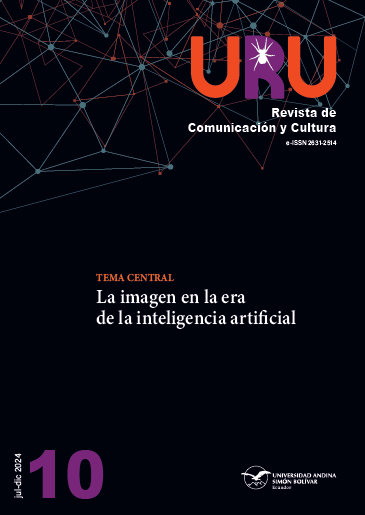Artificial Imagination, Posthuman Image, and Human Thought
DOI:
https://doi.org/10.32719/26312514.2024.10.1Keywords:
Artificial intelligence, artificial imagination, image of thought, abstract machines, unconscious, image, complexity, truthAbstract
The appearance of AI image generators within artificial intelligence suggests the existence of an artificial imagination that drives us to reconsider the relationship between image and thought. Artificial imagination points to a new image of thought, that suits the growing complexity of contemporary reality. To understand the ontology of artificial imagination, which is related to two types of unconscious, the machinic and the human, some of the concepts proposed by Deleuze and Guattari are useful, especially the one related to “abstract machines”. The basic parameters of these new images require reconsidering psychosocial and philosophical areas that are affected by the presence of new technological devices that have appeared within the last phases of capitalism.
Downloads
References
Belting, Hans. 2012. Florencia y Bagdad: Una historia de la mirada entre Oriente y Occidente. Madrid: Akal.
Berardi, Franco. 2003. La fábrica de la infelicidad. Madrid: Traficantes de Sueños.
Buchanan, Ian, y Collins, Lorna. 2014. Deleuze and the Schizoanalysis of Visual Art. Londres: Bloomsbury. DOI: https://doi.org/10.5040/9781472594303
Caro, Antonio. 2023. Semiocapitalismo: Del producto a la marca de la mercancía al signo/mercancía. Madrid: Editorial SB.
Deleuze, Gilles. 2002. Francis Bacon: La lógica de la sensación. Madrid: Arena Libros.
—. 2008. Pintura: El concepto de diagrama. Buenos Aires: Cactus.
—. 2018. Cine III: Verdad y tiempo. Potencias de lo falso. Buenos Aires: Cactus.
—. 2023. Cine IV: Las imágenes del pensamiento. Automatismo, semiótica y actos de fabulación. Buenos Aires: Cactus.
—, y Félix Guattari. 2002. Mil mesetas: Capitalismo y esquizofrenia. Valencia: Pre-Textos.
Derrida, Jacques. 1995. Espectros de Marx: El estado de la deuda, el trabajo del duelo y la Nueva Internacional. Madrid: Trotta.
Didi-Huberman, Georges. 2011. Ante el tiempo. Buenos Aires: Adriana Hidalgo.
—. 2013. Imagen superviviente: La historia del arte y tiempo de los fantasmas según Aby Warburg. Madrid: Adaba.
Fisher, Mark. 2013. Los fantasmas de mi vida: Escritos sobre depresión, hauntología y futuros perdidos. Buenos Aires: Caja Negra.
Guattari, Félix. 2009. L’inconscient machinique: Essais de schizo-analyse. París: Éditions Recherches.
Heidegger, Martin. 1996. Caminos del bosque. Madrid: Alianza Editorial.
Llevadot, Laura. 2018. “Fantasmagoría y espectralidad: Benjamin y Derrida ante la imagen cinematográfica”. Escritura e Imagen 14: 103-21. http://dx.doi.org/10.5209/ESIM.62765. DOI: https://doi.org/10.5209/ESIM.62765
Marx, Karl. 2012. El capital. Madrid: Siglo XXI.
Morin, Edgar. 2001. El cine o el hombre imaginario. Barcelona: Paidós.
Pamart, Jean-Michel. 2012. Deleuze et le cinéma: L’armature philosophique des livres sur le cinéma. París: Éditions Kimé. DOI: https://doi.org/10.3917/kime.pamar.2012.01
Sauvagnargues, Anne. 2015. Deleuze et l’art. París: Presses Universitaires de France.
Stiegler, Bernard. 2016. Dans la disruption: Comment ne pas devenir fou? París: Éditions Les Liens que Libèrent.
Zepke, Stephen. 2005. Art as Abstract Machine: Ontology and Aesthetics in Deleuze and Guattari. Nueva York: Routledge.
Zweig, Stefan. 2012. Momentos estelares de la humanidad. Barcelona: Acantilado.
Published
How to Cite
Issue
Section
License
Copyright (c) 2024 Uru: Revista de Comunicación y Cultura

This work is licensed under a Creative Commons Attribution-NonCommercial-ShareAlike 4.0 International License.
ASSIGNMENT OF RIGHTS, DECLARATION OF CONFLICT OF INTEREST AND DISSEMINATION
The authors who publish in this journal accept the following conditions:
- Authors retain copyright and grant the journal the right of first publication, with the work registered under the Creative Commons Attribution-NonCommercial-ShareAlike 4.0 License, which allows sharing, adapting and attributing the work (see: Open Access Policies).
- Authors can make other independent and additional contractual agreements for the distribution of the article published in this journal (e.g., include it in an institutional repository or publish it in a book) as long as they expressly indicate that the article was published for the first time in Uru: Revista de Comunicación y Cultura. In the case of reproduction, a note similar to the following must be included: This text was originally published in the journal Uru: Revista de Comunicación y Cultura N ° -, year of publication.
- Authors are encouraged to publish their work on the Internet (e.g. on institutional or personal pages) in the final version published by Uru: Revista de Comunicaicón y Cultura as it may lead to a wider and faster dissemination of the published work.








